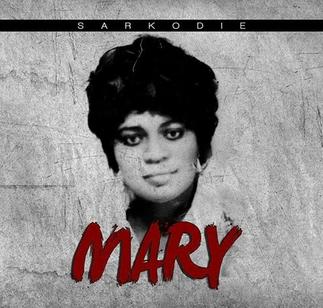For decades now, many among the older generation in West Africa have expressed a certain amount of scorn for the Afrobeats/hiplife takeover. Typically, the criticism comes down to the fact that today’s artists don’t use instruments like their forefathers. Sarkodie’s grandmother, a huge supporter of the rapper’s career, also had one frequent request for her grandson--that he add some guitars to his music! To honor his grandmother's memory, Sarkodie named his fourth studio album Mary (available for purchase on Amazon from Sarkcess Music) after her, and used live instruments in the making of the album. While many could rightly insist that there is nothing inherently worse about using samples and synthesizers instead of guitars and drums, the new arrangement does make the album stand out from Sarkodie’s Afrobeats compatriots. A new release by Sarkodie, one of West Africa’s biggest stars, fresh off a triumphant headlining appearance at the Apollo in Harlem, would always be a big deal, but the use of live instruments makes this one seem like an especially important moment for Ghanaian music.
Perhaps in tribute to his grandmother and other strong Ghanaian women, the voice of Efya, the Ghanaian neo-soul singer, is actually the first heard on the album. She sings tenderly, “Fantasy is what some ladies want, but reality is what I really need.” When Sarkodie does make his entrance, it is with his trademark gusto, rapping at breakneck speed in Twi and English. Even so, the album takes some time to pick up momentum. By Mary’s third track,“Mewu,” which was released back in July, Sarkodie is thoroughly in his zone, rapping with wild abandon over a terrific production (guitars included) from Akwaboah, who also sings on the track.
By the end of the next track, “Always On My Mind,” the guitars have entered full on rock opera mode. On “Bra,” Sarkodie is joined by highlife legend Pat Thomas, who recently released the superb album Pat Thomas and Kwashibu Area Band. Both artists sound at the top of their game on the song, and Thomas’ warm singing complements Sarkodie's gruff rapping well.
Throughout the album, the main topic that holds the tracks together is love. The intricacies of Sarkodie’s thoughts on the subject can be lost on non-Twi speakers, as he effortlessly shifts between English and his native language. However, Akwaboah’s goofy yet debonair chorus on “Nobody’s Business” does a good job of channeling Sarkodie’s light-heartedly romantic attitude: “Tonight is just me and you, just a table for two. Wanna make you my boo. Is all I really wanna do.” Together, Sarkodie and Akwaboah are masters of delicately crafted yet muscular pop music. The album took two years to make, and songs like “Edwom Te S3n” demonstrate how well that long process paid off. On that song, a subtle reggae backbeat leads into a melodically thrilling chorus.
The album’s most compelling moment is the title track, which begins with the crackling sound of an old record. Sarkodie sings quite impressively in Twi to open the song before a horn section joins in. “Ah? What else?” Sarko asks, taking a moment to soak in his own accomplishments. The song is the moment on the album in which hiplife and highlife meet most convincingly. With this tribute to his grandmother, Sarkodie is also honoring the older generation of Ghanaian musicians, recognizing the music of his ancestors, while introducing his own spin on it. That, after all, is how music stays vital and reaches new heights of innovation. On the album’s last song, “Sarkcess Story,” Sarkodie raps, “Think about where I came from/No shoes, no shirts, no cars, and no income.” A lot has changed for Sarkodie since those less fortunate days of his childhood. He is now an icon, beloved by millions of fans in Ghana and around the world. And yet he has not lost touch with his roots, the music and culture he grew up with.









